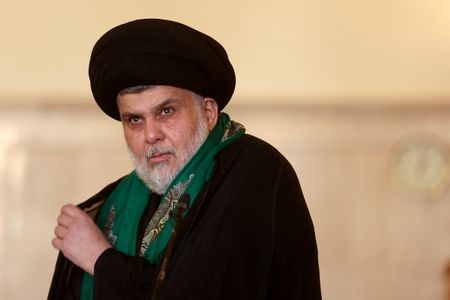 1
1 1
1
BAGHDAD (Reuters) – Protesters stormed the Swedish embassy in Baghdad on Thursday and set it on fire in protest against the expected burning of a Koran in Sweden.
The demonstration was called by supporters of Muqtada al-Sadr, 48, an influential Shi’ite cleric who commands the loyalty of hundreds of thousands of Iraqis.
Here are some facts on Sadr.
– He rose to prominence after the U.S.-led invasion of Iraq in 2003. He formed a militia that fought U.S. troops. He led two anti-U.S. revolts, prompting the Pentagon to call his Mehdi Army militia the biggest threat to Iraq’s security.
In Iraq’s sectarian 2006-2008 civil war, the Mehdi Army was accused of forming death squads that kidnapped and killed Sunni Muslims. Sadr disavowed violence against fellow Iraqis.
In 2008, after clashing with the Iraqi army, he disbanded the Mehdi Army, renaming it the Peace Brigades.
– He is the son of revered Grand Ayatollah Mohammed Sadeq al-Sadr, who was assassinated in 1999 after openly criticising then-dictator Saddam Hussein. His father’s cousin, Mohammed Baqir, was also killed by Saddam, in 1980. Sadr wears the black turban of a sayyid – someone recognised as a descendent of the Prophet Mohammad.
– Sadr has opposed Iranian influence in Iraq, setting him apart from other Shi’ite leaders who have close ties to Tehran. He has also called for the departure of the last remaining U.S. troops in Iraq.
– His movement has been a major force in Iraqi politics, winning the most seats in a 2018 legislative election and again in 2021. Following that vote, he tried to form an administration without his Iran-backed rivals, but was thwarted.
In August 2022, he announced his departure from politics, prompting supporters to storm a government palace in Baghdad and fight with rival groups in deadly violence.
Whilst Sadr has stayed on the sidelines, his supporters continue to hold many top jobs in the state bureaucracy.
– He has a track record of mobilising supporters in the streets, including in 2019, when they joined anti-corruption protests that toppled a government led by pro-Iranian parties. In 2022, amid tensions with his Iran-backed rivals, Sadr’s supporters staged a sit-in in the Baghdad parliament.
– He has continued to engage his followers in religious events. In June, he called for protests against Sweden and the expulsion of the Swedish ambassador after the Koran burning in Stockholm by an Iraqi man.
(Compiled by Tom Perry; Editing by Angus MacSwan)